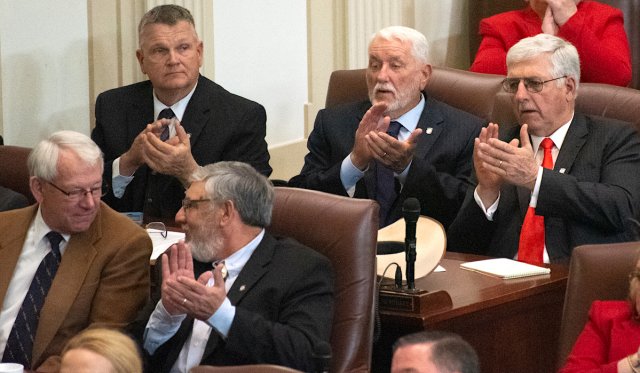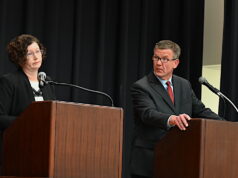

Incumbent Republicans in the Oklahoma State Senate had a dicey Tuesday election night.
Sen. Wayne Shaw (R-Grove) lost to GOP challenger Blake “Cowboy” Stephens after having held his northeastern Oklahoma seat for eight years. Three other incumbents — Sen. Larry Boggs (R-Wilburton), Sen. Ron Sharp (R-Shawnee) and Sen. Paul Scott (R-Duncan) — will be subject to a runoff primary election for their seats on Aug. 25.
They aren’t the only ones. Combined with SD 35 and SD 5, that means a total of five Senate districts will go into runoff elections, as no candidate was able to win more than 50 percent of the vote.
In all, voters cast ballots in 12 Senate districts during Tuesday’s primary election. Online results from the Oklahoma State Election Board are unofficial.
Incumbents drawn into runoffs
In Senate District 3, Wayne Shaw became the only incumbent to lose outright Tuesday, receiving only 40 percent of the vote. The nomination instead went to Stephens, who made an unsuccessful bid for governor in 2018. He will face Democrat Dyllon Fite in the general election.
In Senate District 7, which includes Pittsburg and surrounding counties, Larry Boggs saw a slightly better fate, making his way into a runoff with Warren Hamilton. Boggs received 46 percent of the vote, and Hamilton earned 42 percent.
The winner of the runoff will face Jerry Donathon, who beat Cathy Zukosky Thornton in the Democratic primary.
In Duncan, Paul Scott missed the GOP nomination by only 0.1 percent, garnering 49.9 percent of the votes in Senate District 43, which turned negative as Scott accused challenger Jessica Garvin of being a “liberal political insider” and created a website to tell the “truth” about her. The two will compete in the runoff election with the winner set to face Democrat Terri Reimer for the southwest Oklahoma district.
There is also still a decision to be made in Senate District 17, where incumbent Ron Sharp was forced into a runoff against former state Rep. Shane Jett. In Tuesday’s election, Jett won 44 percent of the vote, with Sharp 11 points behind him. The winner of the special election, scheduled for Aug. 25, will face Libertarian Greg Sadler in November.
Four incumbents hold off challengers
Four Senate races, all of which drew only Republican candidates, were decided in Tuesday’s primary. Incumbents generally held off challengers, with one Representative successfully making the transition to the Senate.
In Senate District 1, incumbent Sen. Micheal Bergstrom (R-Adair) beat challenger James Fuser, a former director for the Oklahoma Farm Bureau. Bergstrom won the Adair-area seat, garnering almost two-thirds of the vote.
In the southeastern part of the state, Carisa Roberson failed in her challenge of incumbent Sen. Greg McCortney (R-Ada) in Senate District 13, reaching only 25 percent of the vote. Robertson, who describes herself as one of the several “abortion abolitionists” challenging incumbents, ran on a platform of ending legalized abortion in Oklahoma.
Incumbent Sen. Roland Pederson (R-Burlington) successfully defended his seat in Senate District 19 against former educator and Endi city commissioner David Mason. He ran on many of the same promises that Pederson, also a former educator, did in his first election in 2016.
Senate District 28 — which has been vacant since former Sen. Jason Smalley stepped down two weeks before the most recent session to accept a job with Motorola Solutions Corp. — saw a three-way race. Current Rep. Zack Taylor (R-Seminole) emerged victorious with 59 percent of the vote, beating out Mike Haines and Christian Ford.
Open seats see double primaries
In addition to SD 28, two other districts without incumbents drew slates of candidates from both parties Tuesday. Both seats will see a Republican runoff after candidates failed to receive more than half the vote.
Senate District 5, which incumbent Sen. Joseph Silk (R-Broken Bow) left to take on U.S. Rep. Markwayne Mullin (R-OK2) in eastern Oklahoma’s 2nd Congressional District this election cycle, drew five candidates. The top two Republicans, Justin Jackson and George Burns, will move on to the runoff for the seat in the southeastern corner of the state. The winner of that election will face Randy Coleman, who won the Democratic primary.
In Tulsa, six candidates competed to replace incumbent Sen. Gary Stanislawski (R-Tulsa), who termed out after 12 years in the Senate District 35 seat.
In the Republican primary, Cheryl Baber and Kyden Creekpaum finished in the top two, with Baber about 10 points behind Creekpaum. The competition, which has already gone negative, centered around allegations that both Baber and Creekpaum are more liberal than they were presenting themselves — Baber because of her service as an assistant U.S. attorney under President Barack Obama, and Creekpaum for receiving donations from donors who supported Hillary Clinton and being employed at a law firm that sued to block President Donald Trump’s Tulsa rally. This conflict was described in a Facebook post by Baber on June 27.
Jo Anna Dossett won the Democratic primary, beating out two other candidates. Her brother, Sen. J.J. Dossett (D-Owasso) represents neighboring Senate District 34.
Living to fight in November
Norman city councilperson Alex Scott succeeded in a Democratic primary bid to challenge incumbent Sen. Rob Standridge (R-Norman) for Senate District 15. Scott beat Matt Hecox in the Democratic primary by 20 points. Scott has recently received statewide attention for her support of Norman Citizens for Racial Justice in their efforts to cut the police budget in the city, helping the advocates achieve move over $800,000 from the police budget to oversight and community programming. She was also arrested at the Trump rally in Tulsa under charges of obstructing and interfering with a police officer after she climbed on a flagpole.
In Senate District 37, Cody Rogers won the Republican primary against Chris Emerson with just over half the vote. He will challenge incumbent Sen. Alison Ikley-Freeman (D-Tulsa) in November. Ikley-Freeman, who was injured in a car accident at the end of the most recent session, flipped the Tulsa seat in a special election in 2017 by 31 votes. She is only the third openly LGBTQ person to be elected to the Oklahoma Legislature.
Runoff election details
Of the 25 Senate seats up for grabs this cycle, eight were uncontested, with GOP incumbents winning reelection by default. Another five seats, each of which has just one Democratic challenger to the Republican incumbent, will be decided in the Nov. 3 general election.
The runoff election will take place Aug. 25 in districts 5, 7, 17, 35 and 43. The general will take place on Nov. 3.





















